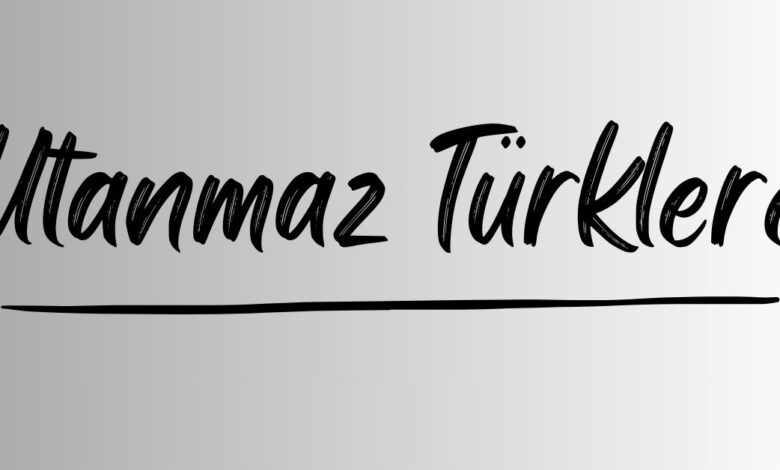Understanding Utanmaz Türklere: A Cultural and Social Exploration

The phrase “Utanmaz Türklere” refers to a culturally loaded term used within Turkish society, typically describing individuals who defy traditional social norms regarding behavior, morality, and conduct. While it carries a heavy social stigma, it has also evolved over time, reflecting shifting societal values and the complex nature of Turkish identity. In this article, we explore what Utanmaz Türklere means, its historical roots, and its impact on modern Turkish culture and social norms. We also dive into the controversies surrounding the term, how it is perceived across generations, and its role in political and media discourse.
Historical Context of “Utanmaz Türklere”
The term “Utanmaz” translates to “shameless” in English, often carrying a moral judgment. Historically, the phrase was used to describe those who engaged in behaviors that were considered inappropriate by traditional Turkish standards, such as defying family values or engaging in behaviors perceived as immoral. Over the years, the term has evolved from its strictly cultural connotation to encompass a broader critique of social and political issues, particularly surrounding gender and modernity.
The Social Perception of “Utanmaz Türklere”
The perception of Utanmaz Türklere varies widely within Turkish society. Older generations tend to view it as a grave insult, often associated with a loss of cultural integrity. However, among younger Turks, especially in urban areas, the term may be used less seriously or even as a badge of defiance against outdated conventions. The rise of social media has played a key role in reshaping the meaning of Utanmaz Türklere, allowing individuals to express themselves freely and challenge conventional morality in ways that were previously unthinkable.
The Role of “Utanmaz Türklere” in Turkish Identity
Turkish identity is a complex tapestry of traditional values, Islamic faith, and secular modernity. Utanmaz Türklere represents the friction between these elements. On one hand, it symbolizes the pushback against conservative values that prioritize family honor, modesty, and gender roles. On the other hand, it also highlights the ongoing struggle within Turkey to reconcile its rich cultural heritage with globalizing influences that challenge established norms.
Cultural Misunderstandings: How the Term Is Misinterpreted
Outsiders may view the term Utanmaz Türklere as a reflection of backwardness or repression, not understanding the nuanced cultural debate it sparks within Turkey. For instance, Western observers might interpret the term as a way to suppress individual freedoms, while within Turkey, it can be a form of protest against outdated norms. These differing interpretations can lead to cultural misunderstandings and affect diplomatic relations.
“Utanmaz Türklere” in Literature and Arts
Throughout Turkish history, literature and the arts have served as important outlets for expressing complex societal issues. Writers and artists have explored the concept of Utanmaz Türklere in various forms, often critiquing the rigid expectations placed on individuals by society. These portrayals help to foster a deeper understanding of the term, encouraging conversations about morality, freedom, and cultural identity.
The Gender Perspective: Is “Utanmaz Türklere” Gender-Specific?
While Utanmaz Türklere can technically apply to both men and women, it is often used more frequently in reference to women. The societal expectations placed on women in Turkey—particularly around modesty, family roles, and behavior—make them more vulnerable to being labeled as “shameless.” This gendered dimension of the term reflects broader gender inequalities in Turkish society, where women are often judged more harshly for challenging traditional norms.
The Role of Religion in Understanding “Utanmaz Türklere”
Religion, particularly Islam, plays a significant role in shaping the moral compass of Turkish society. Islamic teachings emphasize modesty, family values, and social conformity, which are often invoked when discussing Utanmaz Türklere. However, Turkey’s secular framework has led to a divide between religious and secular interpretations of morality. This divide has contributed to the evolving nature of the term, especially in modern urban contexts where secularism is more pronounced.
“Utanmaz Türklere” and the Changing Social Norms
As Turkish society becomes more globalized and modernized, traditional social norms are being challenged. The younger generation, in particular, is more inclined to reject rigid cultural definitions of morality. The rise of feminist movements and LGBTQ+ rights advocacy has also contributed to the rethinking of Utanmaz Türklere as a tool of social control, rather than a legitimate moral judgment.
The Influence of Westernization on “Utanmaz Türklere”
The influx of Western ideals, such as individual freedom, gender equality, and open expression, has influenced the perception of Utanmaz Türklere. In many ways, these Western influences have empowered individuals to redefine themselves outside of traditional Turkish norms. However, this shift has also created tensions, as conservative factions in Turkey resist what they see as the erosion of cultural and religious values.
The Impact of “Utanmaz Türklere” on Political Discourse
Politicians in Turkey have sometimes used terms like Utanmaz Türklere to frame political debates, particularly around issues of morality, gender equality, and national identity. By labeling certain groups as “shameless,” they can rally conservative voters who fear the loss of traditional values. This political usage highlights the ongoing struggle between modernity and tradition in Turkey’s political landscape.
Utanmaz Türklere in Popular Media
The term Utanmaz Türklere frequently appears in Turkish popular media, from television shows to social media platforms. These portrayals often reflect the internal cultural debates happening in the country, with some media outlets emphasizing the need for social change, while others reinforce traditional values. Influencers and celebrities also play a crucial role in reshaping the term’s meaning, either by embracing or rejecting the label.
The Psychological Effects of “Utanmaz Türklere”
Being labeled as Utanmaz Türklere can have profound psychological effects on individuals. It can lead to feelings of shame, guilt, or alienation, especially for those who challenge societal expectations. The psychological toll of this label is particularly evident in women, who may experience heightened pressure to conform to traditional roles.
How “Utanmaz Türklere” Influences Turkish Families
Within families, the term Utanmaz Türklere is often used to discipline and control behavior, particularly in relation to daughters or younger family members. Parents may use this term to reinforce traditional values and expectations, leading to intergenerational tensions as younger family members push back against restrictive norms.
Conclusion
Utanmaz Türklere is not just a term; it is a reflection of Turkey’s ongoing cultural and social evolution. As Turkish society grapples with modernity, globalization, and changing gender roles, the term continues to spark debates about identity, morality, and individual freedom. Understanding Utanmaz Türklere requires a deep dive into the cultural, historical, and social contexts in which it operates, offering insights into the complexities of Turkish society.
FAQs
What does “Utanmaz Türklere” mean in contemporary Turkish culture?
It refers to individuals who defy traditional moral standards, often used pejoratively to describe people who challenge social norms.
How does religion impact the perception of “Utanmaz Türklere”?
Islamic teachings emphasize modesty and social conformity, which influence the perception of “Utanmaz Türklere” in Turkish society.
Is “Utanmaz Türklere” more common in urban or rural areas?
The term is more commonly used in rural areas where traditional values hold greater sway, but it is increasingly discussed in urban settings as well.
How can misconceptions about “Utanmaz Türklere” be addressed internationally?
Education and cross-cultural dialogue can help clarify the term’s significance and the cultural debates surrounding it.
What role does the media play in shaping views on “Utanmaz Türklere”?
The media both reflects and shapes public perceptions of the term, with portrayals that either challenge or reinforce traditional values.



